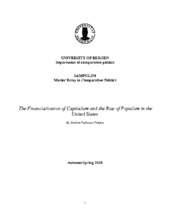| dc.description.abstract | This paper seeks to make sense of the rise of populism in the United States, as evidenced by Donald Trump's election victory in 2016. It takes as its starting point that many of the current explanations circulating in the mainstream media, pointing towards among other; racism, misogyny, Russian bots or the Podesta emails, are ultimately unsatisfactory and a distraction. These explanations simply state a statistic or fact, without providing any explanation of what has allowed the current political culture and polarization in US society to ultimately proliferate. A figure like Trump doesn't just appear by himself in a well functioning democracy, rather it is my contention that he is the result of a secular process of political, economic and social decay. This realization prompted me to look deeper into the profound structural changes the international economy has undergone since the 1970s, when we began witnessing what has been termed the financialization of capitalism. Inequality today are back at levels last seen in the 1920s and 30s, also a time period where the world saw the emergence of populism, a development which would ultimately prove catastrophic. Through the use of historical analysis and process tracing, I carry out a step by step analysis of financialization, beginning with the abandonment of Bretton Woods in 1971 and the birth of neoliberalism. In the aftermath of this, the world transitioned to a credit driven economy, and with each important pivot – from the rise of securitization as a global funding mechanism; to the evolution of a wholesale banking system, capable of conjuring its own funding out of thin air, and ultimately, the eventual collapse during the financial crisis of 2008 – a clearer picture emerges in terms of understanding the current political context. The profound complexity of a financial system in the process of destroying its host, coupled with the realization that the American political system can no longer be accurately described as a democracy; allows me to contend that the populist response we're now witnessing, was to be expected. The post-war international order was always a historical anomaly. It is therefore this thesis contention, that unless we embark upon a journey where we completely alter our economic and political systems as well as redefine our relationship with nature, our societies will keep producing political abominations like Trump and lead us down the path towards authoritarianism. | en_US |
